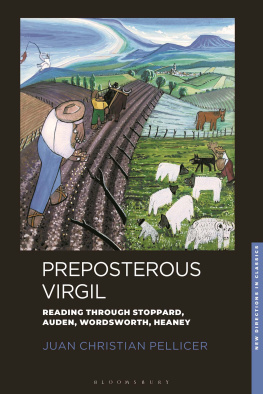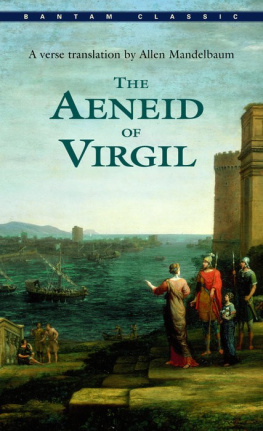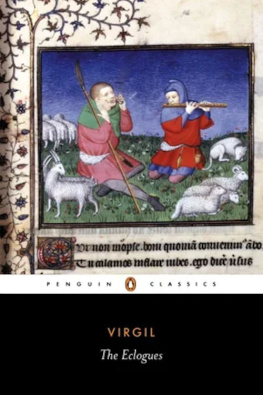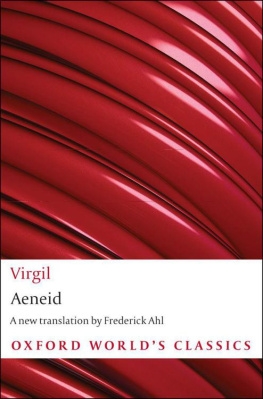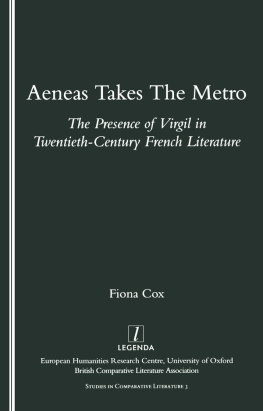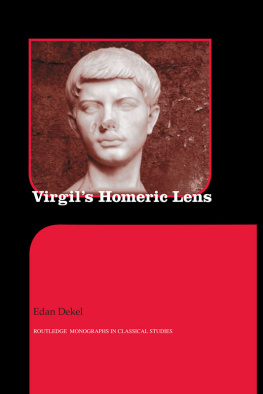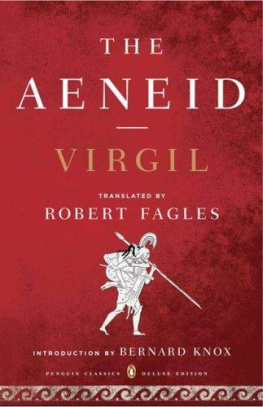
Preposterous Virgil
For Helene and Elias
NEW DIRECTIONS IN CLASSICS
New Directions in Classics is a series of short monographs on Classical antiquity and its reception, covering subjects from across the entire spectrum of ancient Mediterranean culture, including its literature, history, material survivals, and their afterlife in diverse media. These volumes move the discipline of Classics forward by breaking new ground, whether in their combination of sources or their method, and by presenting pluralist studies that blend and transcend modes of analysis that have enriched Classics, broadly defined, in recent decades. As fresh and stimulating takes on their topics they are characterized by their dynamism, intellectual energy, and interdisciplinary scope, and are accessible without compromising on academic rigour.
Editors
Nora Goldschmidt (Durham University)
Fiachra Mac Grin (University College London)
Charles Martindale (University of Bristol)
Editorial Board
George Boys-Stones (University of Toronto)
Joy Connolly (The Graduate Center, CUNY)
Stuart Gillespie (University of Glasgow)
Barbara Graziosi (Princeton University)
Duncan F. Kennedy (University of Bristol)
Miriam Leonard (University College London)
Nicoletta Momigliano (University of Bristol)
Neville Morley (University of Exeter)
Robin Osborne (University of Cambridge)
Richard Thomas (Harvard University)
Greg Woolf (University of California, Los Angeles)
Titles in the series
Antiquity and the Meanings of Time: A Philosophy of Ancient and Modern Literature, Duncan F. Kennedy
In Search of the Labyrinth: The Cultural Legacy of Minoan Crete, Nicoletta Momigliano
Pindar and the Sublime: Greek Myth, Reception, and Lyric Experience by Robert L. Fowler
The Modernity of Ancient Sculpture: Greek Sculpture and Modern Art from Winckelmann to Picasso, Elizabeth Prettejohn
Thucydides and the Idea of History, Neville Morley

Contents
This book has taken so long that I must not only express gratitude but offer apologies to those who have aided me in the course of writing it. Heartfelt thanks to the original series editors, Charles Martindale and Duncan Kennedy, and to Alex Wright, then editor at I B Tauris, for their kindness. Charless encouragement and criticism have sustained me from first to last. My other guiding light is Tim Saunders, treasured friend and reader. I am profoundly grateful to Fiachra Mac Grin for his erudite guidance and unsparing help, which have been critical to the enterprise, and to Nora Goldschmidt for her invaluable comments on the manuscript when it was nearing completion. Lily Mac Mahon at Bloomsbury has been extremely helpful, as has been Alice Wright. Warm thanks to Lisa Carden for her skilful copy-editing, and to the anonymous reader, whose generosity is keenly felt. John Goodridge and David Fairer, heroes of long standing, have also cheered me on and commented on parts of the manuscript at various stages. Alison Martin helped greatly with Sackville-West. Peter Davidson introduced me to Ian Hamilton Finlay. All these readers and supporters have improved my work. The remaining blights are someone elses fault entirely.
I should also like to thank the following for various kinds of help, generosity and encouragement: Monika Asztalos, Silvio Br, Kathleen Coleman, Tom Jones, Jakob Lothe, Anastasia Maravela, Cathinka Neverdal, Kirsti Sellevold, Mathilde Skoie, Richard Thomas and Abigail Williams, as well as colleagues at the Department of Literature, Area Studies and European Languages at the University of Oslo, my Naples of the North.
Warm thanks to the staffs of the Humanities Library at the University of Oslo and the Bodleian Library, Oxford. I especially cherish the memory of the late Vera Ryhajlo of the Upper Reading Room.
The members of my family have been characteristically supportive. I would especially like to thank my parents, Juan and Holly Pellicer, for lighting my way. My uncle, Carlos Pellicer Lpez, whose art gives me great joy, gave permission to reproduce the painting on the cover of this book. I am sustained by friendships of many years: Knut Andreas Strm-Gundersen, Richard Burrows, ivind Bratberg. The book is dedicated to my children, who make my life delightful.
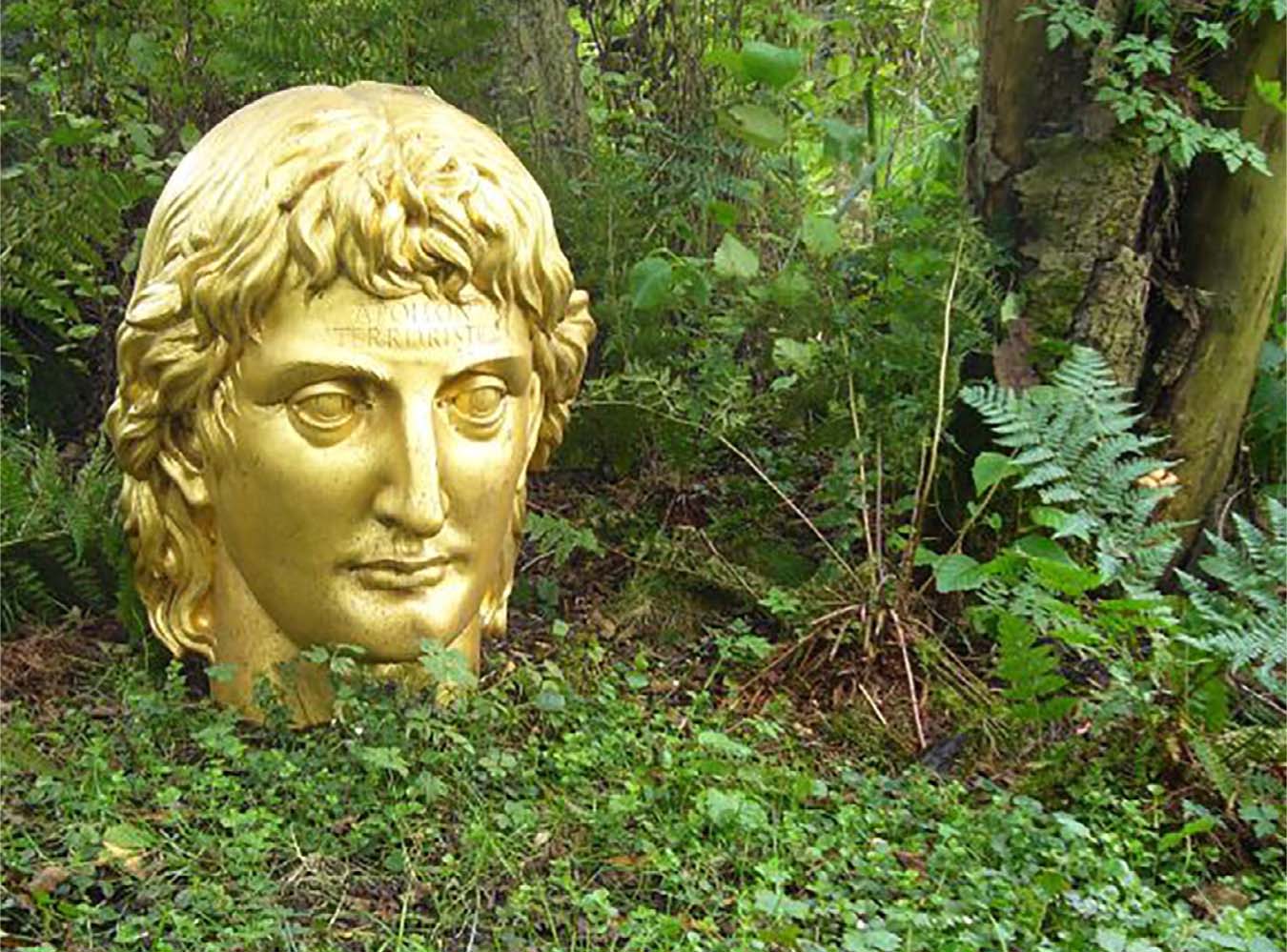
In Little Sparta, the Temple of Apollo bears this dedication: TO APOLLO | HIS MUSIC | HIS MISSILES | HIS MUSES.
The garden is Little Sparta, created by the artist and poet Ian Hamilton Saint-Just and the Apollonian figures with whom he is associated. The already complex issue of what these figures may be taken to mean is always complicated by the question of how seriously they should be taken. The reader of the garden (who may be a reader first and foremost, if the garden is visited through the medium of an illustrated book) is prevented from making a conclusive judgement of the gardens tone.
If Saint-Just is figured as Apollo in Finlays garden, or vice versa, does this necessarily have anything to do with Virgil? Not necessarily; it depends on the context. Which is to say, it depends on contextualization. Like texts themselves, contexts are what a reader puts together. In the context I made from my reading of Finlays Virgilian inscription FLUTE, BEGIN WITH ME ARCADIAN NOTES and its engraved figure of the machine-gun flute, which I joined with Finlays Temple dedication TO APOLLO | HIS MUSIC | HIS MISSILES | HIS MUSES, the Saint-Just Apollo takes on a Virgilian significance. Once this idea is established, further questions suggest themselves. Since the figure of Apollo not only pervades Virgils works but appears in many forms and guises, which Virgilian versions of Apollo should we discern in the figures of Finlays Saint-Just? These questions touch on a condition of literary interpretation to which this book will continually return, namely the instability at the heart of reading itself. For even as readers and critics need to make interpretative decisions that take them one way or another, these decisions do not (or should not) remain frozen but must be remade with each reading. The tonal indeterminacy that characterizes mock-heroic (how seriously do we take Finlays composite Apollo?) sensitizes readers to a fundamental aspect of literary interpretation, namely its ongoingness, its provisional state.
Apollo plays a programmatic role in Virgils Eclogues, not only as presider over the golden age announced in the Messianic Eclogue 4 (10, tuus iam regnat Apollo, Your own Apollo now is king!), but also as the poets own mentor in Eclogue 6, where the speaker recalls Apollos admonishment against entertaining epic ambitions. Virgil has Apollo instruct the poems speaker that a shepherd (i.e., a This Apollo is an arbiter of literary style.
Apollo also plays a key role in the development of another of Virgils central themes throughout his works, namely the relation between the muses and the missiles, between poetry and power. At the centre of the Georgics, Apollo is invoked as a pastoral deity (the famous shepherd of Amphrysus) at the head of
Apollo was cultivated as a literary patron by the Hellenistic poet
Virgil concludes the Georgics
Next page
